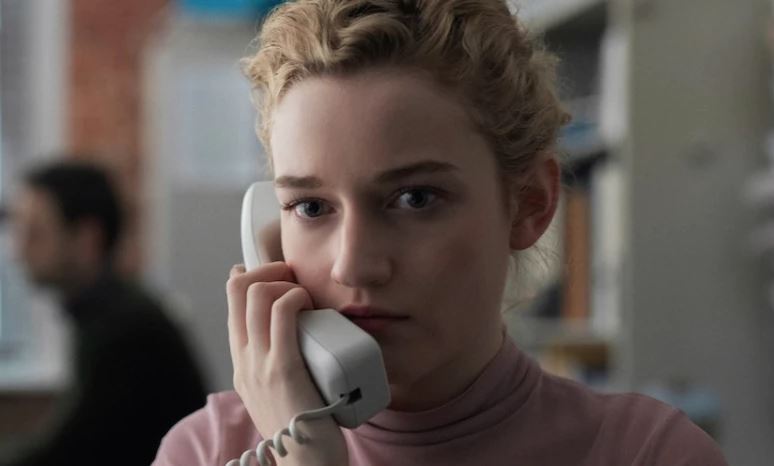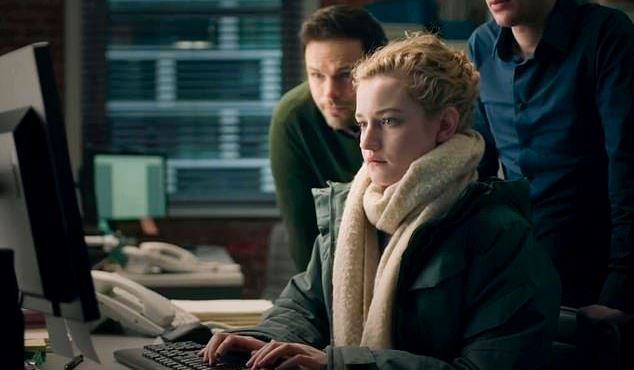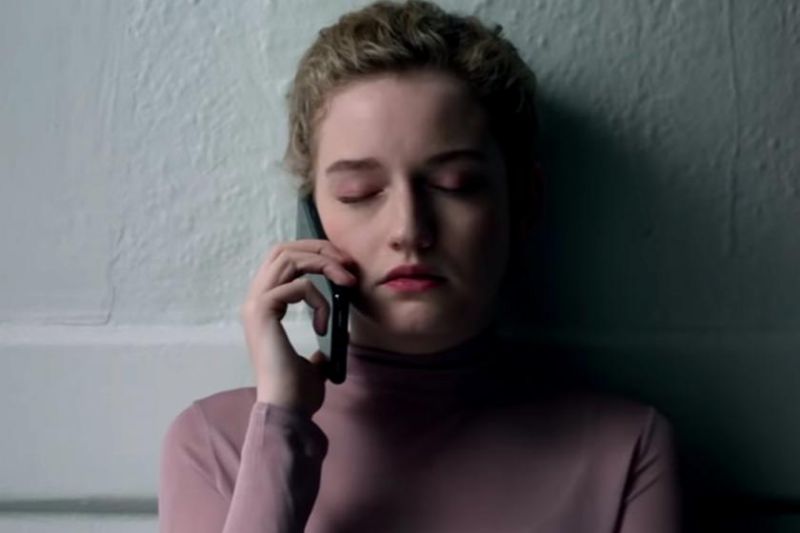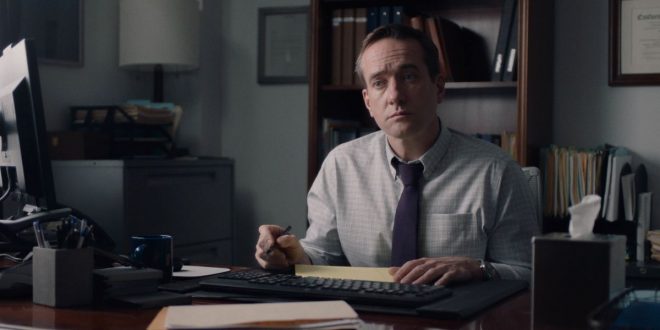
Pronouns work overtime in The Assistant. Characters are constantly discussing the whims and whereabouts of their imperious boss, but they never refer to him by name. “He’s in a meeting.” “I don’t have him right now.” “He wants you on the flight to LA.” They may as well be talking about God. You might know him better as Harvey Weinstein.
But let’s not get too cute. The genius of this sobering movie, which was written and directed by Kitty Green, is that despite its painstaking detail, it isn’t about any particular person. It is instead a searing indictment of an entire ecosystem, a culture of domination, silence, and complicity. Rather than narrow its scope to the exploits and exploitations of a specific individual, The Assistant seeks to shine a harsh light on a prejudiced and predatory industry. The paradox of the film—the contradiction that Green deploys so thrillingly and, at times, frustratingly—is that, while its ambitions are undeniably dramatic, it unfolds with an absolute minimum of actual drama.
The Assistant takes place over a single, long, decidedly unglamorous day, in the Manhattan office of an unspecified (see?) movie production company. It is not an inviting place to work. The cloak of anonymity afforded to its nameless, faceless mogul also drapes over the shoulders of its other characters, including our protagonist, a small and thankless cog in a massive media machine. Played with wrenching understatement by Julia Garner, our heroine is credited as Jane, though to my recollection, her name is never spoken. The plainness of her moniker is perhaps a bitter joke on Green’s part, a further signifier of her insignificance and replaceability.

This isn’t to suggest that Jane’s job is meaningless. She works very hard, performing a variety of menial tasks while remaining largely invisible to the corporate bigwigs who occupy the building’s drab offices and who stroll confidently through its dimly lit hallways. (A scene where Jane shares a silent elevator ride with Patrick Wilson, whom we then never see again, encapsulates Green’s quiet-but-loud style.) She makes coffee and smoothies. She photocopies printouts and scrubs stains from carpets. She goes on lunch runs and manages schedules. Most of all, she talks on the phone, fielding calls from all manner of people—agents, actors, drivers, middle managers, the occasional aggrieved wife—who are all wondering if He is available.
It’s drudging work, and Green’s technique only makes it feel even more dehumanizing. The color palette of The Assistant is cold and grey; where some business offices hum with energy, the desks and cubicles here seem leeched of life. The image tends to be crisp but flat, with Green occasionally sprinkling in an overhead view amid all the close-ups and static mid-range shots. Sonically, she likes to make you strain your ears; the other halves of Jane’s phone conversations are barely heard, which underlines their mundanity while further implying that the specific words don’t much matter anyway. Green also declines to use music, a gesture toward stylistic minimalism that suggests a kinship with the Romanian new wave.
As a piece of cinema, The Assistant is cogent, meticulous, and not especially entertaining. It’s one of those movies where very little of substance actually happens, and where the lack of such happenings is precisely the point. Green is painting a raw and unflinching portrait of an industry that’s defined by its resistance to change, an entrenchment whose power dynamics include gender discrimination and vulgar transactionalism. In depicting such a cruelly self-perpetuating world, offering any semblance of catharsis would feel false. This is a film that’s difficult to enjoy, and that difficulty is part of its function.

But even if The Assistant is easier to admire than adore, its structural rigor can still be fascinating to observe. With very little fuss and even less volume, Green efficiently maps out a hierarchy of power, a topography of shit rolling downhill. Jane, fresh out of college, shares a large, airless office with two young men (Jon Orsini and Noah Robbins); they technically occupy the same position as she does, but they nevertheless wield a certain amount of authority over their female colleague, whether that involves delegating her to order takeout or throwing crumpled-up balls of paper at her head to get her attention. (They also exhibit some protective instincts; when Jane draws the ire of their fearsome head honcho, they help her craft an apologetic email.) Jane, who sits near the bottom of the food chain, occasionally lashes out at someone with even less standing, as when she berates a chauffeur for not being sufficiently flexible. Yet despite her lowly stature, as her CEO’s emissary, her words still carry weight; when she travels to a different floor to inform an associate that he’d better cancel his dinner plans, he knows better than to quarrel with her.
Looming over everything, sight unseen, is the studio’s abuser-in-chief. That Green never shows the man’s face is the correct approach; he’s scarier as a phantom than a flesh-and-blood person. Instead, she peppers the picture with sharp details—small, seemingly throwaway moments that accumulate into a portrait of entitled monstrosity. A new hire signs a vague agreement. A staffer makes a joke about not sitting on a couch. A woman swings by to pick up an earring, her face flush with shame. Nobody says anything; everybody knows everything.
For the most part, Green isn’t concerned with assembling these nuggets into a broader narrative. But at its rough halfway point, The Assistant develops a sliver of a plot, whereby Jane picks up a fresh-faced woman from Boise (Kristine Froseth) and shepherds her to her boss’ favorite swanky hotel. What happens there is never shown but easily deduced. Racked with guilt, Jane takes what in this movie qualifies as drastic action: She says something.

Specifically, she meets with the company’s head of human resources, played with sublime disingenuousness by Matthew Macfadyen. This tête-à-tête, which is both fateful and meaningless, unspools masterfully, as Macfadyen’s suit shifts his tone from supercilious concern to casual hostility to devastating frankness. (Speaking of Romanian cinema, the sequence evokes the climax of Police, Adjective.) In a matter of minutes, and without resorting to the faintest whiff of melodrama, Green lays bare the whole pitiless system—the architecture of cruelty and ambivalence—that has allowed foully powerful men to run amok in Hollywood for decades.
That scene is a relative jolt in a film that is otherwise commendably, insistently restrained. So the fact that The Assistant packs such a punch is largely thanks to Garner. Forever known to certain viewers as the innocent Kimmy on The Americans, the actor brings the same youthful vulnerability to bear here, only having replaced her bright-eyed desire with a sense of weariness and defeat. Jane is constantly brushing up against barriers—to systemic progress, to professional advancement, to personal fulfillment—and Garner, with her mournful eyes and clipped body language, conceives of her as a brittle woman whose very humanity is crumbling. That’s what makes Jane’s meeting with HR so gutting; it’s the one gasp of good faith from a person whose last glimmers of hope are slowly being snuffed out.
But might actual change be coming to Hollywood? Earlier this week, Weinstein was found guilty of two counts of sexual assault, a watershed moment in the #MeToo era, as well as in the film industry at large. Still, The Assistant isn’t so naïve as to believe that this culture of toxicity, which it articulates with such clarity and force, can be eradicated by removing a single individual. Jane’s workday ends much as it began: alone, on a darkened street, readying for her next stultifying shift. The shadows that haunt her are simply too great to be cast by just one man.
Grade: B+
Jeremy Beck is the editor-in-chief of MovieManifesto. He watches more movies and television than he probably should.
